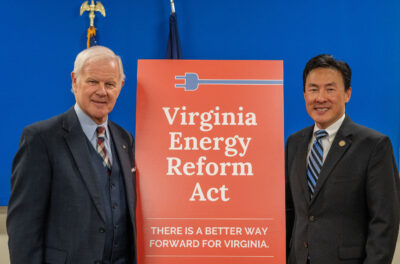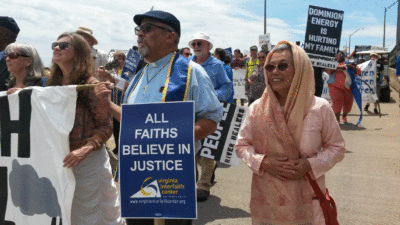Front Porch Blog
This post was co-authored by Peter Anderson, Virginia Program Manager, and Chelsea Barnes, New Economy Program Manager, both of whom are spending time in the Capitol this General Assembly session to push for legislation that will bring positive change for all Virginians.
In November, voters sent a message to policymakers in Virginia that it’s time for a change. For the first time since 1993, the Democrats control both chambers of the legislature and the governor’s office. A record number of women — 30 Democrats and nine Republicans — were elected to the legislature. Del. Eileen Filler-Corn became the first woman and the first Jewish person ever elected speaker in the 400-year history of the Virginia House of Delegates, and Del. Charniele Herring (D-46) will be the first African-American Majority Leader in the House. Sen. Ghazala Hashmi, a first-time candidate, will become the Senate’s first Muslim female member.
Virginians have demanded change. The time is now ripe for changes to the state’s energy policy that will protect consumers, the climate and our air and water. Virginians want access to more affordable, cleaner energy, and their elected representatives have an opportunity to deliver.
Take action on environmental legislation in the Assembly now!
During the 2020 General Assembly session, Appalachian Voices will have a strong presence in the capital. We will advocate for policies in three priority areas: (1) reforming the state’s energy system to put the public interest above the interests of monopoly utilities; (2) ensuring all customers have equal access to clean, affordable energy; and (3) environmental justice.
As our Executive Director Tom Cormons wrote in a letter-to-the-editor published in The New York Times, the real story of this recent election is how many of these new representatives declined funding from the state’s most powerful utility — indeed, when the General Assembly convenes in January, 40 delegates and 9 state senators who refused monopoly utility campaign money will take their seats. This stands in stark contrast to what had been business as usual in Richmond.
Here’s what we’ll be working on.
Electric utility regulation
Ending the monopolies

Del. Ware (l) and Del. Keam introduce the their joint bipartisan bill on Jan. 7, 2020, to end the electric monopoly system in Virginia. Photo by Piedmont Environmental Council.
But changing the paradigm of utility regulation requires additional thoughtful changes in order to deliver cleaner and cheaper electricity to customers. The bill also incorporates measures to:
- Implement all energy efficiency programs that are cost-effective;
- Remove existing interconnection and financing barriers to customer-owned energy resources like rooftop solar; and
- Build in additional consumer protections like a low-income bill assistance program and customer education to ensure smart energy choices.
Setting fair electricity rates
Delegates Lee Ware (R) and. Jay Jones (D) have introduced the bipartisan Fair Energy Bills Act to restore the authority of the State Corporation Commission to review electricity rates and set profit levels for Dominion Energy. According to the SCC, Dominion has collected an excess of at least $1.3 billion from its customers since it pushed its “rate freeze” bill through the General Assembly in 2015. It is urgent that the General Assembly pass this bill now before the SCC reviews Dominion’s earning in 2021.
Fairness in paying for pipelines
Finally, Delegate Ware has also introduced a bill that would ensure the State Corporation Commission can review contracts entered into by monopoly utilities to purchase space or “capacity” on gas pipelines to fuel their power stations. If the SCC finds that the contract is not necessary to meet demand or is not the lowest-cost option for meeting demand, the cost could not be passed on to customers (that’s us!).
Advancing Clean Solar Energy
Renewable energy on former coal mines
Delegate Terry Kilgore (R) will introduce the bipartisan Brightfields Act, which creates the Virginia Brownfield and Coal Mine Renewable Energy Grant Fund and Program. This bill will help make solar and wind projects on coal-impacted lands and brownfields cost-competitive with greenfield projects throughout the Commonwealth.
Solar in Southwest Virginia
We are also working with the Solar Workgroup of Southwest Virginia, lawmakers and other partners to introduce legislation to ensure that the distributed solar market (i.e., rooftop solar for residential and commercial buildings) is successfully established in Southwest Virginia and thrives throughout the Commonwealth. Our goals are to, among other things:- Clarify the legality of third-party power purchase agreements, an important financing mechanism for solar energy;
- Lift arbitrary caps on the total amount of net-metered systems that is allowed and on the maximum size of individual net-metered systems;
- Clarify current law to allow net metering across a right-of-way;
- Allow virtual net metering, a billing mechanism that allows customers to allocate net metering credits to electric meters that aren’t on the same site as the solar installation, for all customer classes;
- Ensure mechanisms that allow renters to benefit from the electricity savings from solar installations on multi-family buildings;
- Create a program that allows independent developers to own and operate community solar systems, provides customers with solar credits through their utility bill, ensures that customers of municipal utilities and rural electric cooperatives have access to community solar programs, and ensures accessibility for low-income customers and organizations providing services to low-income customers.
Environmental Justice

Advocates for environmental justice in Virginia rally in 2019. Photo by Cat McCue/Appalachian Voices.
Track these bills and take action
Other Issues to Keep an Eye On
Joining RGGI. Gov. Northam has previously endorsed Virginia joining a multi-state pact, the Regional Greenhouse Gas Initiative, to cut carbon pollution from power plants through a proven cap-and-trade market. We support joining RGGI so that Virginia can allocate revenues from the RGGI market towards low-income energy efficiency programs and flood resilience while we cut carbon pollution.
Offshore wind. Dominion Energy has proposed building a major offshore wind project, but has so far indicated it would finance the project by passing costs on to consumers. While offshore wind could be an important clean energy resource for Virginia, Appalachian Voices is adamant that financial risk for this kind of project be borne by company shareholders, not ratepayers. Competitive third-party bids should be required for all aspects of the project to ensure customers are not paying more than necessary.
State Corporation Commission authority. Dominion has consistently pushed bills that in one form or another chip away at the SCC’s authority over regulating the industry, including what is deemed in the public interest. We will vigorously oppose any such move in 2020.
PREVIOUS
NEXT
Related News

Leave a comment
Your email address will not be published. Required fields are marked *

